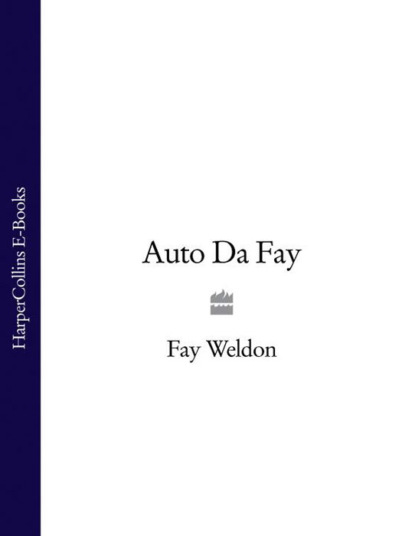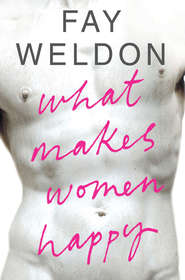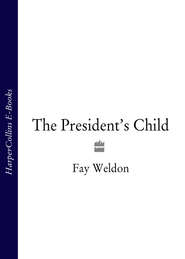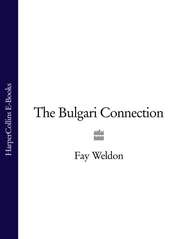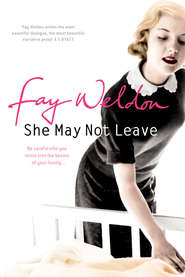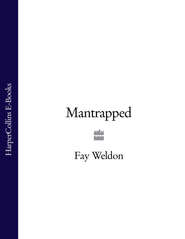По всем вопросам обращайтесь на: info@litportal.ru
(©) 2003-2024.
✖
Auto Da Fay
Настройки чтения
Размер шрифта
Высота строк
Поля
But he did seem to be anxious that his four children would not succeed, and almost to spite him, they all did. He took Frank away from St Edward’s Grammar School in Birmingham and apprenticed him to an engineer, when that was what he specifically didn’t want to be. Sheona, the oldest, was given away in infancy to be brought up by an aunt, and grew up to marry her cousin, an eye surgeon, and to became a poet. For fifty years, until her death in her late Nineties, a poem by Sheona Lodge, delicate and lyrical, appeared regularly in the American Fly Fisher’s Journal. The second daughter, Mary, was active in politics, married Michael Stewart, later to be Foreign Secretary in Harold Wilson’s government, and both ended up on the Labour benches in the House of Lords. Bill became a much respected dentist in the Midlands: once mysteriously married to someone who ‘ran off’, and whose name he would not have mentioned in the house. That was not so unusual a response at the time; the world was full of things too painful to be mentioned, because there was nothing to be done about them. Infidelity, illegitimate children, insanity, cancer – it seemed impolite to God to mention them, pointing the finger because he had failed to make a perfect universe. As cures became available, of course, one by one, they could be talked about, and now are, almost to exhaustion, as if we are making up for lost time.
So my father ran away from his apprenticeship and my not very pleasant grandfather, and was sent to the front line in France, but within the year was invalided out of the mud and slime of the trenches. Next he was posted to Arabia, where the air was all too dry. But he became T. E. Lawrence’s driver: he had a Rolls-Royce to play with, adapted to desert use and armed with a machine gun, which he coaxed up and down impossible sand hills. I think he enjoyed himself very much. He once showed me a battered leather-bound copy of Shakespeare’s Romeo and Juliet, inscribed to him by Lawrence himself. He told me he was captured by Bedouin but saved himself by offering them jam labels, which he told them was money and they believed him. It just so happened that he collected jam labels, there being lots to collect in a desert filled with soldiery who had to eat. They blew about the sand hills.
This part of The War he talked about: he would never speak about the trenches. Perhaps the time spent there was too traumatic: too full of exploding bodies for words to encompass. It made him neurotic. Those who have been soldiers often are: from time to time they behave compulsively. Those who are damaged feel the need to pass it on: those who are hardened try to harden others. Soldiers who emerge from wars are often cheery enough: they have learned the art of living in the present: they’re good at that – today’s friend can be tomorrow’s corpse. Just sometimes they shake and shiver and are cruel to others, and want them to suffer too. Ron Weldon, my second husband, was an ex-soldier, like so many of the generation after my father’s. He had spent time clearing bloated bodies from streams in Burma: he didn’t mention this for a good twenty-five years into the marriage, when he started getting nightmares and handing them on.
After the Armistice Frank went to London and with the aid of demob money and contributions from his maiden aunts in Newcastle, studied medicine at University College Hospital. In 1922 he visited a nightclub and there met and charmed Edgar and Susan Jepson, who took him under their wing. Before long he was sleeping on their sofa, and had begun his assiduous courtship of their daughter Margaret, then a girl of sixteen.
Doors opened to my father. It was a life he had not known before. Those who have a natural and spontaneous response to books, paintings, music and the life of the mind are lucky: the gift of their enthusiasm strikes through class barriers: they find mentors. ‘He was rather rough at the time,’ my mother said of him. ‘He’d been a soldier for years: he’d had no education. He swore dreadfully. He had no money: he slept on other people’s floors and ended up on ours. His aunts came down to visit him and threw up their hands in horror at what they found.’
Perhaps the gift for standing in front of the right door runs in families? When Edgar gravitated to Nona, back in the 1890s, a new world opened up for him, and it suited him down to the ground. Here was the gossipy bohemia of the day: forget the waspish writers and intellectuals, here were painters and musicians, and another kind of delinquency. ‘Through Frieda,’ he wrote in his Memories, ‘I came into the Bloomsbury Group of the day.’ He picked up the ball and ran with it.
Thirty years later Frank was to find himself in the same situation. All he had to date was the copy of Romeo and Juliet from T. E. Lawrence; now Edgar and Nona offered him the culture he was starved of, and he realized he had finally come home. When that home collapsed, he carried the daughter off as a trophy. Another generation on and history repeats itself. My mother’s world, by the virtue of war, divorce, poverty and circumstance had shrunk to subsistence level, and my world with it. Forget the arts and the life of the mind, what about the rent? But go to a party one night, just as Frank had been to a nightclub, and all of a sudden, there you are, back in your natural place: in my case Primrose Hill in the Sixties, the abode of the writers and painters. Go down to the launderette and run into the kind of people who hung out in these parts. Ted Hughes and Sylvia Plath, Patrick Caulfield, Kingsley Amis and Elizabeth Jane Howard, Adrian Mitchell, R. D. Laing and the George Mellys, Tom Maschler the publisher, Mel Calman and Michael Ffolkes, cartoonists, Alan Sharp and Lukas Heller, screenwriters, ANC activists by the handful, Bernice Rubens and David Mercer, and down in Gloucester Crescent Alan Bennett and Jonathan Miller, and as many names as you care to drop, rising young artists and writers all. And the parties we gave were many and wild, and not so different from those at Adelaide Road, except the beer was made in the bath, and the bath was lidded and in the kitchen, and I don’t think Nona would have stood for that. With a permanent place in the lover’s bed, comes a permanent place in their circle. Actual marriage cements it.
Patterns (#ulink_a916867a-b08d-57a2-99bf-cb2aacb9749d)
I am very conscious of the patterns our lives make: of interconnecting cogs and wheels, of coincidence which is no coincidence but fate, of the quiet sources of our energy. All things connect. The lost wedding ring turns up on the day of the divorce; the person you happen to sit next to on the Tube happens to be your new boss. Destiny intervenes. We assume we are playing the lead, but turn out to be bit-part players in someone else’s drama. Nothing is without result.
Even the maiden aunts, Madge and Augusta, who helped Frank become a doctor, were major players in his story, for all the quiet seclusion of their lives. They lived in Newcastle, in a house in which almost nothing had changed since the beginning of the century. Antimacassars protected the armchairs: oil lamps provided the only lighting.
In my student days, when I would hitchhike down from St Andrews in Scotland to St Ives in Cornwall, their house made a useful stopping-off point. The Aunts, who by then were in their nineties, provided a fine refuge from the hunger and tribulations of the open road, especially in winter time. Their ancient maid May lived with them. Most social inequalities had been evened out by the passage of the years, but not all. They would share the warmth of the fire but if more coal were needed it would be May who went to fetch it, and she was the one who got up to make the tea, though she was even more doddery than they. There would be a candle to light you to the unheated spare room, where the bed was so high you had to climb up into it. A flowered china chamber pot was placed beneath it. Springs would creak if you moved: the mattress sagged. The sheets were linen and cold, and the pillow was stiff, but the weight of the many blankets was reassuring. After you had been a little while in the bed it would begin to steam with damp, which was oddly pleasant. In the morning ice crystals would have formed on the inside of the windows. You would put bare feet out onto cold lino, dress as fast as you could and make for the kitchen, where a purple-knuckled May would be making breakfast. The tea would be hot and sweet.
The aunts would give you some money to help you on your way, and wave goodbye from the door as you set out on the road, and you would worry that this was the last time you would ever see them. It seemed a miracle that they existed at all: this was the stuff of fairy-stories, as if they came into existence only to facilitate your journey. When you ceased to see them, they would cease to be.
Missing Mothers (#ulink_efbce4d1-8fc9-5e48-930e-9192a4d70bf5)
It was when we left Amberley and moved to Christchurch that things fell apart. It could not have been expected. Christchurch was, and still is, a quiet, orderly town, the most English of all the New Zealand cities, the respectable face of the original New Zealand Company, which sold off land it did not own to the pioneers. The streets are laid out in rectangles around a central cathedral square, and rather grudging allowances made for the unreasonable curve of the green-banked River Avon. The flat Canterbury plains stretch off to the west to meet the white peaks of the Southern Alps: and to the north, neatly separated off by a soft ridge of hills, is the port of Lyttelton, in what was once a volcanic crater. But all that natural violence and upheaval was long, long ago.
In Amberley we were part of the old original land: the ground was soft beneath bare feet: in Christchurch people wore hats and gloves to go shopping. The sky felt too huge, arched over a city which did not take up enough room. The sense that we were perched at the end of the world, that real life went on somewhere else was very great. Even I felt it, and I was only four, nearly five. My father was to set up his practice in a good part of town. We had a house which was not a bungalow. It had a staircase, and you could look out onto the trams in the front of the house, and a garden with walnut trees and a washing-line at the back. I had a theory that I could fly like an angel and had to be stopped from jumping from the top windows. And I don’t know why it happened, or what exactly the move to the town precipitated, but I began to be conscious of a kind of trouble that ran through the house. I would wake in the night to sounds of discord. Jane frowned a lot. One day my mother put on her hat and gloves to go shopping and came back crying, with an empty basket. We owed money and it was my father’s fault. She’d had no idea.
The King (that was my father) was in his counting house, Counting out his money. (But there wasn’t enough of it) The Queen (that was my mother) was in the parlour Eating bread and honey. (If she was lucky) The maid was in the garden, Hanging out the clothes, Along came a blackbird and pecked off her nose.
The words haunted me. It seemed all too possible. Jane and I had a nursemaid who hung out the clothes and I beseeched her to be careful. Sudden and disagreeable things could happen. I knew that by now. Had we not moved from Amberley to Christchurch? And were there not blackbirds in the walnut tree? I had seen them. I met her fifty years on when I was visiting New Zealand, and I was glad to see she still had her nose. She remembered me more clearly than I remembered her. She said I’d say the oddest things. She’d offered to tell me a story and I said, ‘How can you? You haven’t got a book.’ She said she’d make the story up in her head, and I’d replied, ‘Then your head must be made of paper.’
The sudden and disagreeable things might have had something to do with Ina. Ina was the daughter of my mother’s friend Winifred. Winifred had come to New Zealand as an immigrant foundling at the age of sixteen and been apprenticed to a milliner. She’d met and married a man forty years older than herself, on the understanding that she would nurse him through his terminal illness. This she had done, conceiving Ina on the way. Now she was free, with her husband’s money in the bank. She was plain, practical and very kind. Her daughter Ina was always a trouble to her: beautiful, nervy, arty and spendthrift, running up debts her mother had to pay. She had a long neck and often wore a turban, and when my father read Aristophanes to us, and in one of the plays there was a bird called a Hoopoe, I thought he was probably describing Ina. She would turn up quite a lot at the house and when she did my mother would look baleful.
But nobody, surely, could compete with my beautiful mother? She was so special. She wrote a masque: I was not sure how that could be done, but whatever it was everyone dressed up in flowing robes and did what she told them to do. She spoke from the balcony of the Bishop’s Palace, which looked over green lawns and the River Avon, and everyone clapped. Then there was strawberries for tea. I was very proud of her. But I was proud of my father too. He took Jane and me to Hagley Park, to watch a man with a parachute drift out of the sky. The world was full of marvels. But the marvels and the nightmares had begun to run side by side, racing to see which would win.
There was a night of bangings and crashings, shrieks and slamming doors, during the course of which I was told to go back to bed. In the morning my mother was not there to get me up. My father did it instead and said she’d gone home, for a time. That was strange. Surely where someone lived was their home? On further enquiry home turned out to be another country, up at the top to the right on a page of the atlas. Home was England. We came from England which was why we were called homies.
But if the world was round like an orange, as people tried to tell me, why was it flat on the map? The orange theory did not make sense. Half the people in the world would be going round upside-down if it were true. I did not much like being tucked away at the bottom of the flat page, so far from anywhere else, tiny little lengths of red, set in a pale blue sea, so far from my mother on her way to the top of the page, but it was better than being on some huge orange. And at least now I had my father to myself.
But why had she gone and when would she be back? I couldn’t get much sense out of Jane: all anyone said, including her, was that I was too young to understand. Without my mother in it, the house seemed curiously light and free, as if we could all now just have a good time. But within days, my father, Jane and I had moved out of the house, said goodbye to our nursemaid, and were living in a private hotel near Cranmer Square.
Cranmer Square (#ulink_360ff732-885a-5004-b0d5-2175c28588a4)
Cranmer Square was not actually a square but an oblong, its grass intersected by paths in the pattern of the Union Jack. In this city of boxy bungalows set in neat gardens it seemed to me a significant place, if sloppily named. Nearly all the buildings which lined it had stairs: that is to say they were more than one storey high. There was the Girls’ High School at the north end, and St Margaret’s to the west and the Normal School to the south. In between were boarding-houses and hotels. On wet days, when heavy rain drummed on the ground and made the corrugated-iron roofs rattle, slugs and snails would come out in enormous number to cover the stripes of the Union Jack, making walking hazardous. The crack of a snail beneath the shoe or the sight of a squashed worm strikes horror into the little-girl heart. There were few wet days, of course: winter in Christchurch was an eight-week affair and then it was over. The nor’wester was a worse affliction; wake up to see the arch of cloud in a heavy sky, and know that within hours the hard, hot, strong wind would get up and blow for days, making everyone cross and tired.
Our winter was England’s summer: that was strange. In the conservatory of the private hotel which was now our home the apples and the oranges would come out as my father and his friends tried to prove to me that the earth was round, not flat, and circled the sun, like this, and the moon went round the earth, like that, and why night happened and so on. It still did not seem convincing. As well claim we were all living in the fruit bowl.
Jane and I shared a high damp steamy bed in the front ground-floor room. The bedspread was made of bright green artificial silk which was chilly and slippery to the touch. I cried a little on the first night we slept in it, and was proud of Jane, who didn’t cry at all. There wasn’t a pot under the bed and we didn’t know where the lavatory was, so that night Jane wee-ed on the round Chinese carpet. She said it was their fault, not hers, and I wondered as I have often wondered all my life, who ‘they’ were. I didn’t like to witness her desperation, but marvelled at her pride and determination.
We ate our meals in the dining room with the other guests. I could see there were advantages to this situation. There was no one to fuss about washing your hands or combing your hair or worrying what you were doing. If there was anything you didn’t know Jane probably would, and at least in an emergency she could be relied upon to tell you. My father took much more notice of us now my mother was out of the way, and I resolved to look after him properly, and make him happier than she had. I would never go off and leave him the way she did: I could see I was too small to take her place but I would do my best.
But my father had other ideas. I was not allowed into his bed, for one thing. Ina came in and out, wearing her absurd silk turbans and heavy strings of wooden beads, hooting and chirping away. Rita Angus the painter would drift palely in, look sad and drift out again. Then there was Jean Stephenson and Helen Shaw. Jean was thin and clever and edited the New Zealand Listener. How on earth did you edit a person and what was he listening for, I wondered. It sounded very important, like being Prime Minister. Helen was rounded and creamy skinned: I thought she was like Helen of Troy, in the Walter de la Mare poem my mother used to murmur.
Helen of Troy was beautiful,
As all the flowers of May:
Her loveliness from the walls looked down,
Over the towers of Troy town,
Hundreds of miles away.
But my mother was beginning to feel very far away, and wherever she was, had taken herself there without much reference to me. Why should I care? Jane and I were both going to St Margaret’s school now. We wore green uniforms and panama hats. I liked school, but could wish for more from home. It wasn’t the kind that other children had. Other children didn’t live in hotels and had a mother to collect them:
we had a different lady friend to do it practically every day. They all seemed to want us to like them, mind you, and were forever giving us things. At Easter I was given so much chocolate I was sick. I asked for a car for my birthday and was given a toy one, not a real one, and then they wondered why I was crying: if I’d had a proper mother she could have explained. Why on earth would I want a toy car? I was a girl. I was Fay. No one ever called me Franklin now.
Rita Angus, or Rita Cook, as we knew her, one of my father’s friends, took it into her head to paint a portrait of Jane and myself. Rita was to be reckoned as one of New Zealand’s finest painters, but at the time was seen as a rather eccentric dabbler in the arts. The portrait now hangs in New Zealand’s National Gallery. We were put in our matching check dresses and told to sit still. Jane managed this very well but I couldn’t. I kept running off to get a drink of water. I somehow lost the belt of my green cardigan and Rita had to paint it out. She sat our dolls in a row above us but dressed them up first in a rather formal way which in my opinion didn’t suit their personalities at all. She put in some of the hotel teacups, and painted them to give us a rest from sitting still. She was very nice, though we didn’t think we looked at all the way she had painted us. We were more real and lasting on the canvas than we were in real life. But we were very polite. We knew instinctively from an early age that the artist’s sensibilities are to be protected, lest they give up altogether and walk off into the night.
I got up one morning and my legs wouldn’t work. I had poliomyelitis, or infantile paralysis. It could kill you or lame you: I knew about that. Everyone was terrified of it all over the map, or up and down the orange. I was a map person, Jane was an orange person. I could see by now that she was right but I wasn’t going to admit it. I was given a bed in the conservatory and Jane wasn’t allowed to come near me. The waitress would put my food down and run away. My father cried, but I knew it was all right: he was the best doctor in the world and would see to it. And nothing bad could happen to me: fate was on my side. And so it was. Today, when I’m tired my right ankle tends to turn my foot in a little, but that’s all. There was some talk at the time about callipers, which happily soon went away.
By now Jane and I were so close I hardly noticed any difference between her and me. We seemed one body. Even our names were bracketed together. We were called Jane’nFay. My father was standing for parliament: I watched to see if he stood up more than usual but no, he sat down just as much as ever. What were they all talking about?
One day at school, as I lay sleepless on my mat on the floor, a woman I didn’t know bent over me. It was afternoon-nap time, a torment if ever there was one. You had to lie in rows on the floor for what seemed forever, when all you wanted to do was run about. This still quietness, this ‘rest’, seemed such a waste of life. The stranger wore a scarlet pillbox hat with a little black veil, so her face seemed covered with small black dots. She kissed me and said she was my mother and I was to get up now. That was a relief. Jane confirmed that she was who she said she was and she took us out of school for the day. I asked her what her name was and she said it was Margaret. I seemed to remember that.
We sat in Cranmer Square for a bit and I told her about the worms. She said that at home it had rained a lot. I asked her whether the ship had had to climb up the sea to get to the equator, and she said no, and dropped a stone and explained the theory of gravity. Jane said she knew that already. Then my mother took us back to the private hotel but did not stay. Nor did my father ask her to. It was amazing how the lady friends seemed to melt away, and how quiet everything suddenly was.
Via Panama (#ulink_832c2394-d77b-552d-9f69-7374b15ac7d1)
In his Memories Edgar remarks that my mother was a better writer than either he or Selwyn, and that her novel Via Panama was proof of it. He complained that it was gloomy, and it is perhaps not surprising if it was. It was written on her journey back to Christchurch, whence she had fled so impetuously from Frank’s infidelities and his embarrassing failure to keep out of debt. She had been trying to establish a life for herself in London, and had found a flat and, miraculously, a job on the News Chronicle as a journalist. This would pay just about enough to enable her to support herself and her two daughters. She would return to New Zealand to fetch us as soon as she had got the money together.
The first letter she received from Frank said that if she did not come back at once he would take Jane’nFay to South America and she would never see us again. Rightly, she did not believe him. She did not reply. But his second letter was brief and to the point. Fay had polio and Margaret must come home at once before it was ‘too late’. Overwhelmed by anxiety and guilt, she took the next boat home, giving up both the flat and her job. Trapped on shipboard for six weeks, without news of her younger daughter, not knowing what she would find when she disembarked, she spent the time writing a novel.
Via Panama was about the shipboard voyage out; and contained a thinly disguised portrait of my father, whom she clearly still loved, and of her fellow-passengers, mostly New Zealanders, whom she affected to despise for their drunken and provincial ways. The novel was published both in England and the US to critical acclaim – and for a thirty-year-old young woman it was a triumph – but when it reached New Zealand there was uproar. She had insulted her hosts: she was an ingrate, the worst kind of homie. She put on airs: she thought herself too good for New Zealand. She was not Public Enemy Number One – that role was preserved for my father, who was standing for election as a socialist candidate – but she was Public Enemy Number Two. Frank lost the election because of Via Panama – or so he believed – and my mother was so shaken and upset by its reception that she resolved – as her father had once done before her – never to write a ‘serious’ book again. From henceforth she would write only to entertain. (Edgar’s first novel, The Passion for Romance, written when he was at Oxford, had been ‘serious’, had taken him three years to write and earned him only £6.19s. It was on financial grounds that he came to the same decision. Or so he said. Forget art, forget literature, forget enlightening his readers as to the ways of the world, and the state of their souls, the rent must be paid.)
In my mother’s footsteps, some forty years later, I was to write a television play about an English husband going home with his new second wife to the New Zealand outback – affectionately known as the boondocks – to an uneasy welcome which included Pavlova cake and separate beds. That got me into trouble, too. I was accused of stereotyping New Zealand women, portraying them as backward in their attitudes, cake bakers all. Useless to say but I’m not writing documentary, I am under no obligation to produce a fair and balanced view, this is a particular story about particular people – such arguments never convince those predisposed to take offence. But I was older than my mother was when she wrote Via Panama, and tougher, I daresay, and others came to my defence and I was soon forgiven. But for my poor mother, alone and far from home, the uproar was definitive. Had she been to school, I daresay, she would have been better able to cope.
For a time my mother was able to support us, just about, by her pen. Over the next few years, under the name Pearl Bellairs or Bentley Ridge, she was to write a run of romantic serials – Velvet and Steel, The Cups of Alexander – which were published in London by Herbert Jenkins, then Edgar’s publisher. Her editor wrote in enthusiasm to say she had readers queuing up for them in the bookstores as they came out. She’d write by hand in bed, in tiny script, with a fountain pen; and then get up and type it all out on a clattery typewriter. My contribution was to pick out the ink which clogged up the keys. I used a pin. The o’s and the e’s, the most frequent of the letters in the alphabet closely followed by the t’s, were always most in need of cleaning. I loved doing it. Typescripts, in the days of the typewriter, always had an individuality of their own. Microsoft produces a clean, uniform print, for which we should be grateful, but something’s lost as something’s gained.
My mother borrowed the name Pearl Bellairs from the vapid romantic novelist in Aldous Huxley’s novel Crome Yellow – she was saying, I suppose, to anyone who might happen to make the connection: ‘I can do better than this, I am worth more than this, it’s just I have to make a living.’
She worried greatly about the morality of writing romance: she thought it was wrong to put false ideas into the heads of young women: better that they understood that marriage was not necessarily a happy end, and that poor helpless girl catches strong handsome rich man was simply not the way the world went. And she had a point: Velvet and Steel – with its overtones of Pride and Prejudice – the helpless shop girl wooed by her wealthy employer, bringing him to heel by virtue of charm, wit and personality, would today, alas, read as a sorry case of sexual harassment.
Then the war came, and forget principle, the sea-lanes became impassable. Ships were torpedoed, manuscripts went down with everything else: there was a shortage of paper, and none to be spared for frivolities like fiction: that was the end of that, for four or five years.
My mother took advantage of the impossibility of earning a living from these problematic works, and started what she called her magnum opus: a book of philosophy, which dealt with the relationship between morality and aesthetics. She did not type this out: it remained in handwriting: thousands of overwritten pages, which would get in a hopeless muddle on the kitchen table. I wished she would not; I knew even when small how important it was to keep papers collated and in moderate order. The eighty per cent behind you had to be more or less finished and complete, if it was not to distract you and make you restless as you moved ahead into the unknown. What you were working on currently required chaos, what was behind must be orderly, or you would be overwhelmed by confusion.





